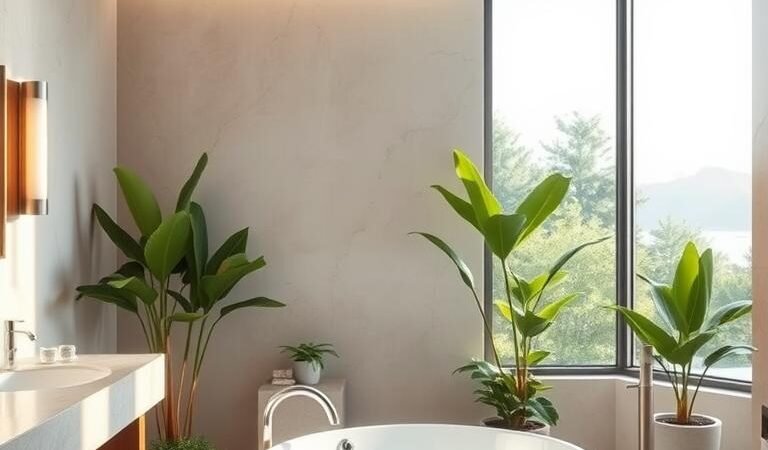Your home should be a sanctuary—especially the room where you start and end each day. A well-designed retreat blends simplicity with comfort, turning everyday routines into moments of peace. By focusing on clean lines, soothing textures, and thoughtful details, you can craft a space that feels both functional and indulgent.
You don’t need a full renovation to achieve this look. Small upgrades—like adding humidity-loving plants or swapping harsh lighting for soft, warm tones—can make a big difference. The right materials, such as natural stone or wood accents, enhance the sensory experience, making the area feel more inviting.
This guide explores 16 design tips to help you create a personal oasis. From smart storage solutions to calming color palettes, each suggestion is tailored for effortless transformation. Whether you’re decluttering or rethinking layouts, these ideas work for any budget.
Key Takeaways
- Simple changes can turn your space into a peaceful retreat.
- Natural elements like plants and wood add warmth.
- Soft lighting enhances relaxation.
- Decluttering creates a cleaner, more open feel.
- Strategic upgrades don’t require a full remodel.
1. Embrace a Soothing Color Palette
Color sets the mood in any space—especially one meant for relaxation. The right color palette blends subtlety with intention, turning walls and surfaces into silent partners in your daily unwind. Think warm grays that echo river stones or soft blues mirroring shallow coastal waters.
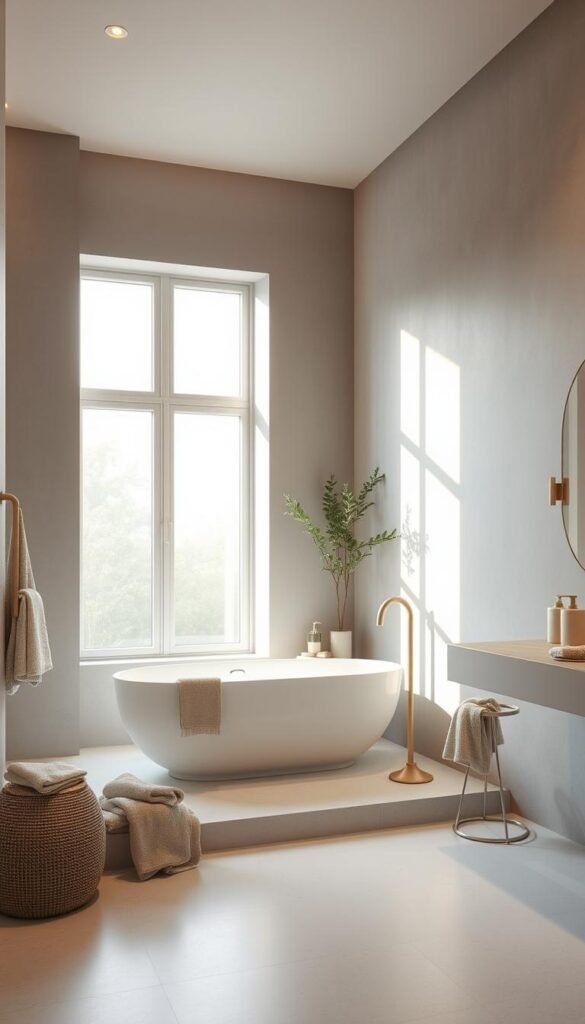
Best Colors for Tranquility
Neutrals like Sherwin-Williams Alabaster create a serene backdrop, while seafoam greens add gentle energy. These colors work because they mimic natural environments—think foggy mornings or sun-dappled lakes. Avoid stark contrasts (like black-and-white) that disrupt visual harmony.
Neutral vs. Nature-Inspired Hues
Layer matte eggshell walls with satin-finish trim for depth. Farrow & Ball’s Pale Powder pairs beautifully with warm wood tones, bridging nature and neutrality. Unlike energizing citrus yellows, these hues slow the pulse, making them ideal for a spa-like bathroom.
Pro tip: Skip trend-driven accent walls. Instead, use tonal variations—a deeper shade on the lower half of walls—to maintain flow without monotony.
2. Declutter for Serenity
Visual calm begins with intentional organization. A streamlined space reduces stress, letting the mind unwind. Start by assessing what’s essential—every item should earn its place.
Streamlining Countertops
Adopt the 5/10 rule: Limit visible items to five per 10 square feet. Decant shampoos into uniform glass bottles for a cohesive look. Dorai’s Bath Stone™ Mat doubles as storage—cool underfoot, chic in design.
Smart Storage Solutions
Group essentials by routine. Keep morning products in one zone, evening items in another. Recessed medicine cabinets with built-in outlets hide toothbrushes while charging devices.
- IKEA GODMORGON series: Sleek vanity drawers conceal daily clutter.
- Anti-fog mirror cabinets: Integrated lighting adds function without bulk.
- Floating shelves: Display a single plant or candle, leaving airiness below.
These tweaks enhance the bathroom feel without sacrificing minimalist design. Less clutter means more space for tranquility.
3. Upgrade to Luxurious Towels and Linens
Soft, high-quality fabrics transform daily routines into indulgent rituals. The right towels and linens elevate comfort while adding a touch of luxury to your space. Focus on materials that feel as good as they look.
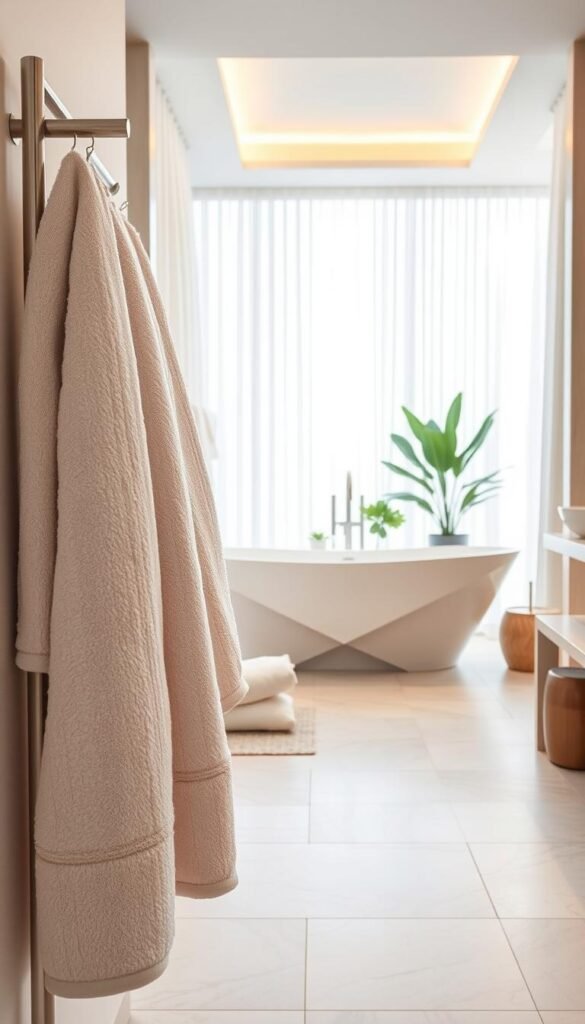
Choosing the Right Materials
Turkish cotton and bamboo blends lead the pack for plushness and absorbency. Look for a GSM weight between 600-900—this range ensures a thick, cozy feel without excessive drying time. Brands like Parachute Home offer bundles for a coordinated, hotel-inspired look.
The Warmth of Towel Warmers
A heated rack adds instant spa-like comfort. Amazer’s models use minimal energy—just $0.10-$0.30 daily—while keeping bathroom essentials toasty. Fold or roll towels neatly for a polished display that invites relaxation.
- Maintenance tip: Spritz linens with antimicrobial sprays to prolong freshness between washes.
- Style hack: Layer different textures, like a waffle-weave robe over smooth sheets, for visual depth.
Small upgrades in fabric choices create big sensory rewards. For more inspiration, explore these spa bathroom ideas to complete your retreat.
4. Install a Rainfall Showerhead
Upgrading your shower experience starts with selecting the perfect rainfall showerhead. The gentle, wide-coverage spray mimics natural rain, turning a daily rinse into a sensory retreat. For optimal performance, pair it with thoughtful fixtures and proper water pressure.
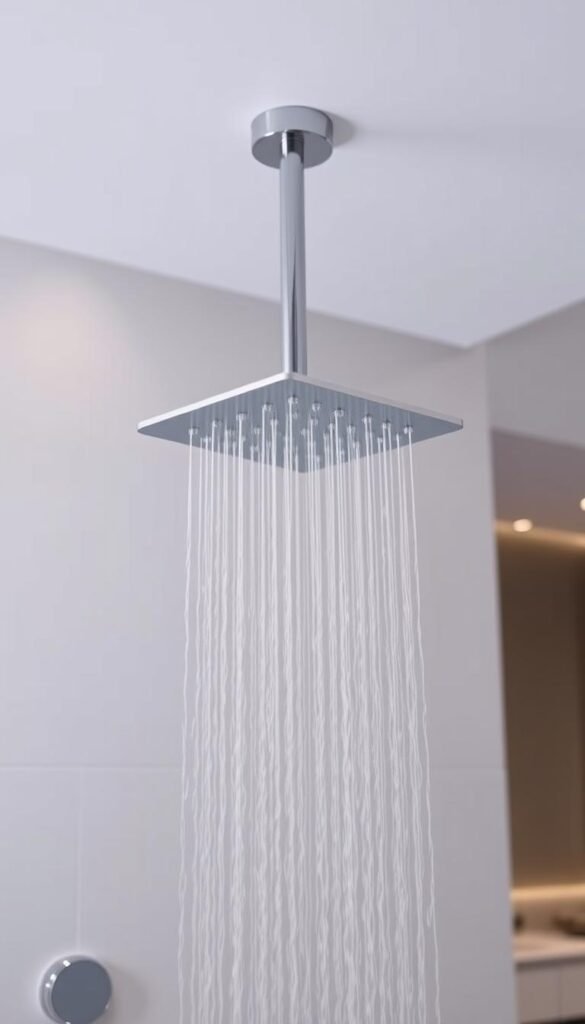
Types of Showerheads
Standard models (2.5GPM) deliver a stronger stream, while rainfall versions (1.8GPM) prioritize a softer cascade. The Moen S6300EP offers an 8-inch coverage area—ideal for full-body relaxation. For low-pressure homes, the Waterpik SM-443 ensures steady flow without sacrificing comfort.
Water Pressure Considerations
Most rain showerheads require at least 45 PSI. Test your home’s pressure with a gauge (under $10 at hardware stores). If it’s low, opt for a pressure-balance valve to stabilize temperature or a thermostatic valve for precise control.
- Installation tip: Hiring a plumber costs $150-$300, but DIY kits are available for confident homeowners.
- Design bonus: Add a TeakWorks4U stool for seating—a small touch that enhances the bathroom design.
5. Incorporate Natural Materials
Nature’s textures bring warmth and balance to any retreat. From grainy teak to polished quartzite, natural materials add depth and timelessness. These elements bridge indoor comfort with organic beauty, making spaces feel grounded yet refined.
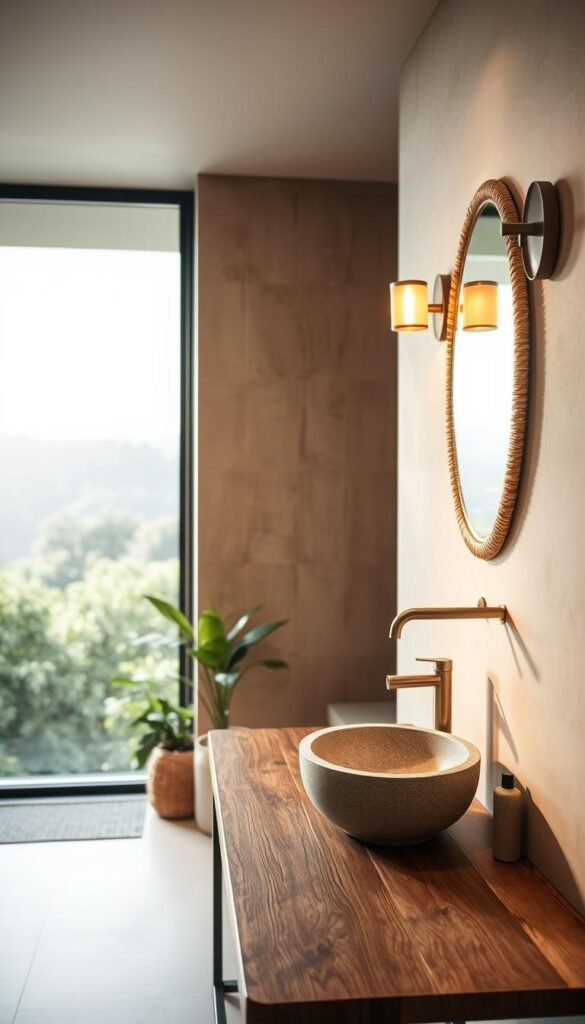
Wood and Stone Accents
Teak shower mats resist water damage, while stone countertops like quartzite offer stain resistance. Avoid porous options (limestone) in wet zones—they require sealing. For floors, porcelain tiles mimic travertine’s look with twice the durability.
Sustainable Choices
FSC-certified wood (iroko, acacia) supports ethical sourcing. Recycled glass countertops (like Vetrazzo) provide unique color flecks. Fireclay Tile’s eco-glazes skip harsh chemicals, pairing sustainability with artisan appeal.
| Material | Best For | Maintenance |
|---|---|---|
| Teak | Shower mats, shelves | Oil annually |
| Porcelain Tile | Floors, walls | Low; stain-proof |
| Quartzite | Countertops | Seal yearly |
| Recycled Glass | Backsplashes | No sealing |
- Pro tip: Pair matte wood finishes with honed stone for tactile contrast.
- Avoid: Glossy surfaces—they show water spots and disrupt a spa-like atmosphere.
6. Designing a Calming Minimalist Bathroom for a Spa-Like Atmosphere
Smart space planning turns a small area into a functional retreat. A well-designed layout blends clean aesthetics with effortless usability, ensuring every element serves a purpose. Follow industry standards like NKBA’s 36″ clearance around fixtures to avoid cramped movements.
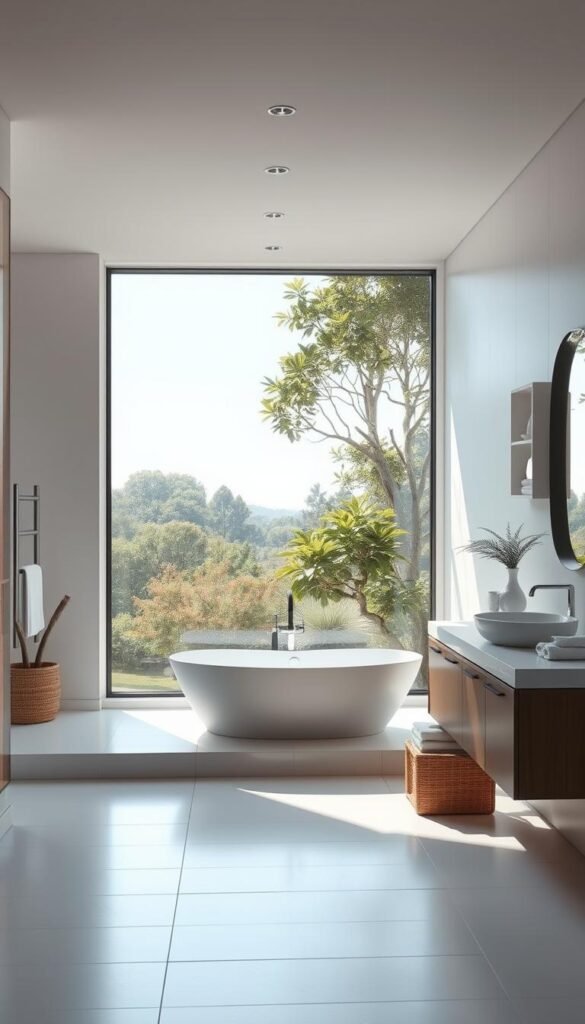
Balancing Minimalism and Practicality
Edit ruthlessly—keep only what enhances daily routines. For example, Kohler’s Veil toilets save space with sleek profiles. Floating vanities maintain openness while offering storage. The goal? A minimalist look that doesn’t sacrifice functionality.
Key Principles for Efficient Layouts
Divide the area into three zones: prep (vanity), wash (shower/tub), and storage. Keep towels within 24″ of the shower for convenience. Single vanities suit narrow spaces, while doubles add symmetry for shared areas.
- Wet zones: Use waterproof materials like porcelain tiles near showers to manage steam.
- Reach distances: Store daily essentials within arm’s reach (max 24″).
- Footprint comparison: Single vanities need 30″ width; doubles require 60″+.
Thoughtful bathroom design transforms tight corners into streamlined sanctuaries. By prioritizing flow and accessibility, even compact spaces feel expansive.
7. Add Layers of Soft Lighting
Lighting transforms a space from functional to deeply relaxing with just a flick of a switch. The right blend of brightness and warmth crafts an ambiance that soothes rather than overwhelms. For a truly spa-inspired feel, balance three types: ambient, task, and accent.
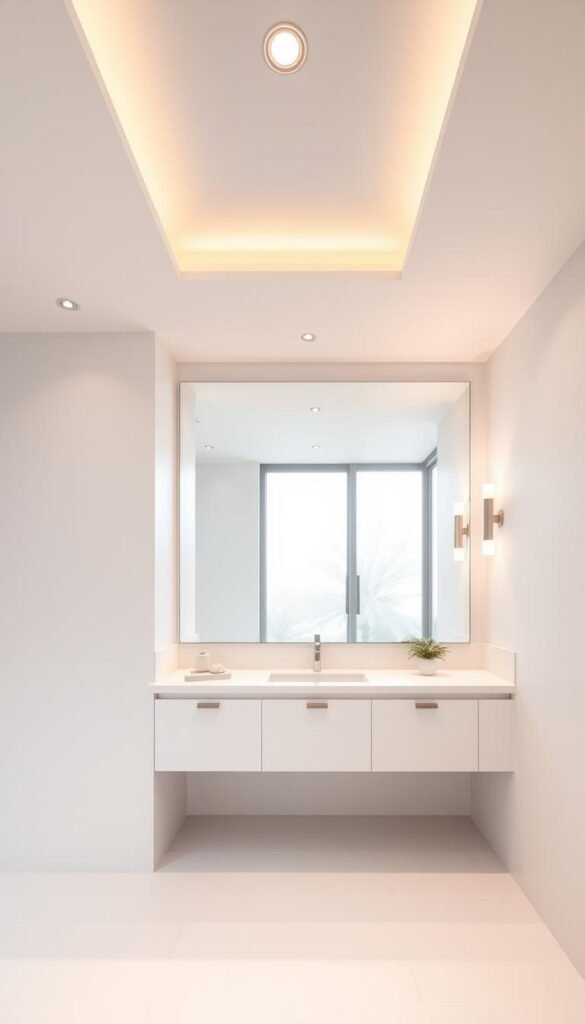
Ambient vs. Task Lighting
Ambient lighting sets the base mood—think ceiling fixtures or wall sconces with 2700K-3000K bulbs. Task lighting, like vanity LEDs, ensures precision for grooming. A smart mirror with built-in lights merges both, offering adjustable brightness for different needs.
The Power of Dimmers
Lutron Caséta dimmers let you fine-tune intensity. Lower lights by 50% for evening baths to signal relaxation. Pair with dimmable LED strips under cabinets for a floating glow that enhances depth without glare.
- Lumen math: Aim for 75-100 lumens per square foot. A 100 sq ft space needs 7,500-10,000 lumens total.
- Layer ratios: 50% ambient (overhead), 30% task (mirror), 20% accent (niche lighting).
- Avoid: Recessed lights alone—they create shadows that feel cavernous.
Pro tip: Use frosted glass fixtures to diffuse light evenly, eliminating harsh spots. This subtle touch elevates the lighting scheme from practical to luxurious.
8. Introduce Aromatherapy Elements
Scent has the power to shift moods instantly—like stepping into a forest after rain. In a retreat designed for relaxation, aromatherapy bridges the gap between aesthetics and sensory immersion. A few strategic additions can elevate ordinary routines into a spa experience.
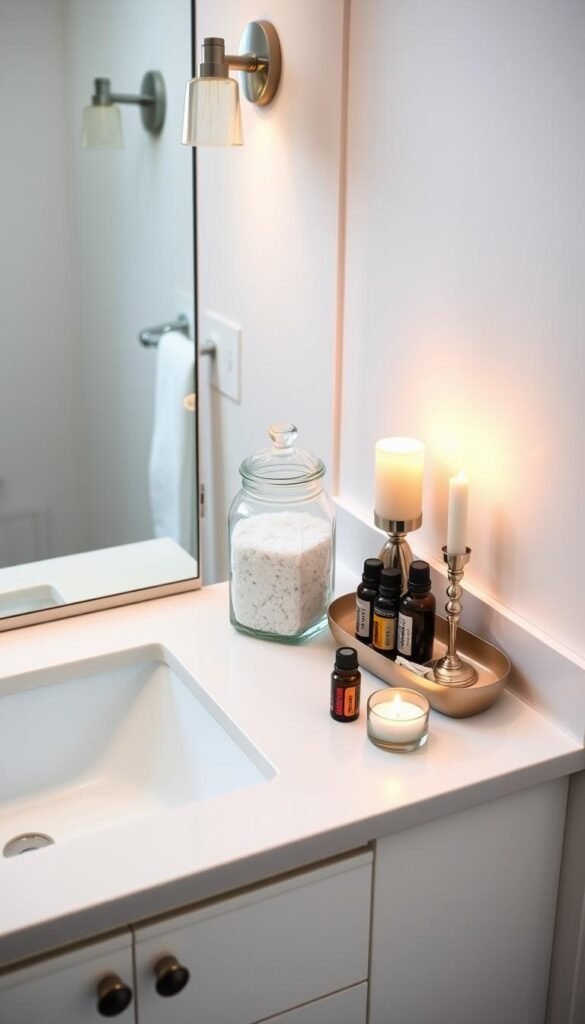
Essential Oils for Relaxation
Plant Therapy’s lavender oil is a standout for its calming properties. Unlike synthetic sprays, pure essential oils interact with the limbic system, easing stress. For steam-safe use, dilute 2–3 drops in water—direct application can damage surfaces.
| Diffuser Type | Best For | Maintenance |
|---|---|---|
| Ultrasonic | Small spaces | Weekly cleaning |
| Nebulizing | Large bathrooms | No water needed |
Eucalyptus Shower Bundles
Eucalypso’s bundles release crisp, menthol notes when hung near showerheads. The steam activates the leaves, clearing sinuses and sharpening focus. For a DIY version:
- Wrap fresh eucalyptus stems with twine.
- Loop around the showerhead—avoid direct water contact.
- Replace every 3 weeks for peak fragrance.
Safety note: Citrus oils (like lemon) can degrade sealants. Stick to woodsy or floral scents for longevity. The Mistifi diffuser is ideal for larger spaces, dispersing oils evenly without overpowering.
9. Choose Heated Floors for Comfort
Few upgrades blend comfort and practicality like radiant floor heating. Stepping onto warm tiles elevates everyday moments—no more icy shocks underfoot. Whether retrofitting or remodeling, these systems deliver consistent warmth while enhancing energy efficiency.
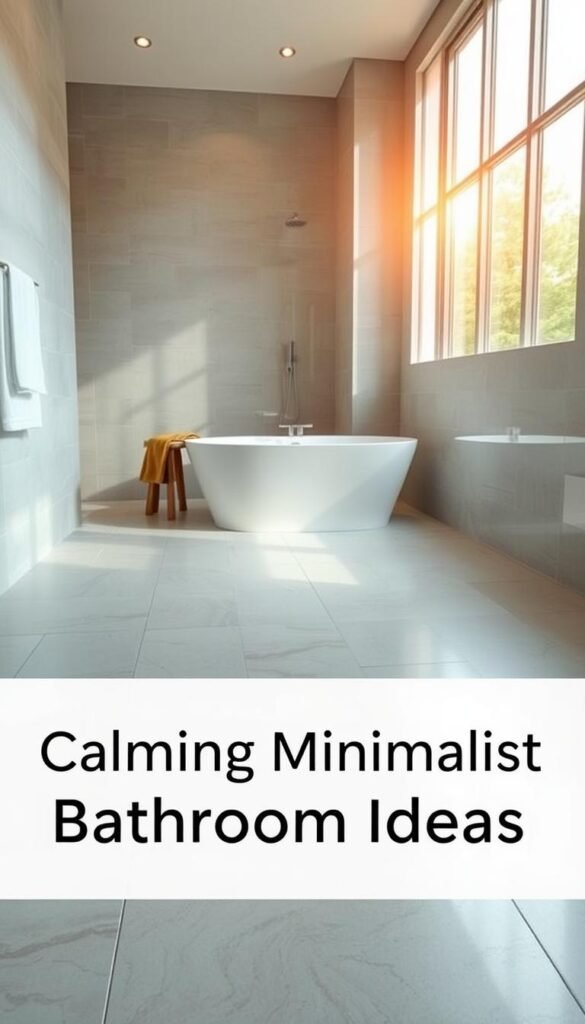
Installation Made Simple
Two primary systems dominate the market: electric and hydronic. Electric mats (like Nuheat) are DIY-friendly, while hydronic tubes require professional plumbing. WarmlyYours’ systems cost $8–$15/sq ft installed, ideal for targeted bathroom upgrades.
| System Type | Best For | Installation Time |
|---|---|---|
| Electric Mats | Small spaces, retrofits | 1–2 days |
| Hydronic Tubes | Whole-house heating | 3–5 days |
Smart Energy Use
Operating costs average $0.20–$0.40 daily. Programmable thermostats (like Nest) optimize usage by warming floors before peak hours. For existing floors, thin electric mats slide under tiles—no demolition needed.
- Retrofit tip: Use Schluter®-DITRA underlayment for heat distribution.
- Eco perk: Hydronic systems pair with solar water heaters for lower bills.
- Luxury touch: Pair with a teak bench for a spa-like seating area.
From frosty mornings to late-night soaks, heated floors redefine indulgence. This upgrade pays off in daily delight—and long-term home value.
10. Opt for a Freestanding Bathtub
Nothing anchors a retreat like the sculptural presence of a freestanding tub. These standalone pieces marry artistry with hydrotherapy, becoming instant focal points. Whether curved or angular, they command attention while offering deep-soak comfort.
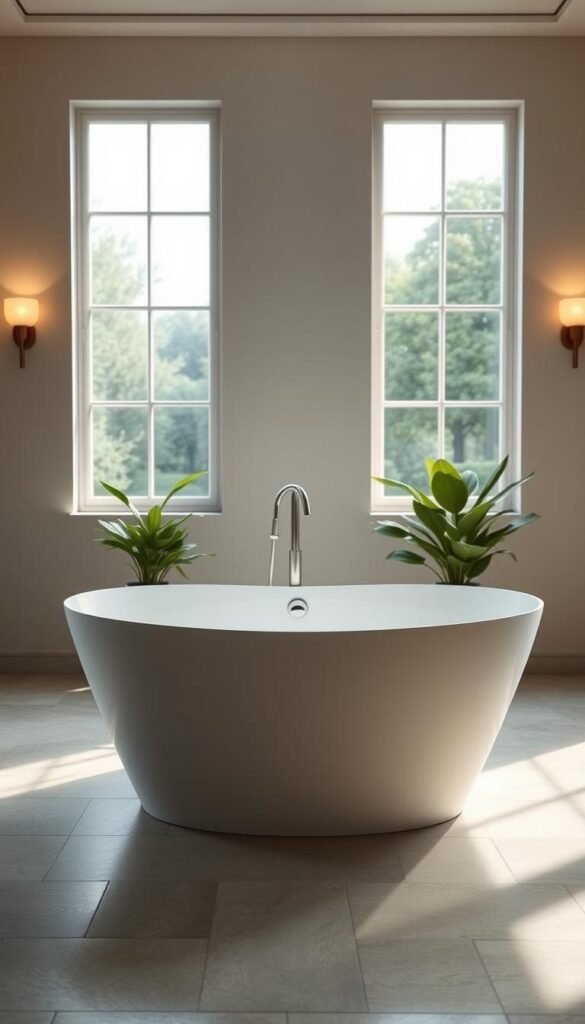
Material Matters: Acrylic vs. Stone
MTI Baths’ acrylic models (100lbs) are lightweight yet durable—ideal for upstairs installations. Natural stone options like quartzite add earthy elegance but weigh 300+ lbs. Pro tip: Skip cast iron if floor reinforcement isn’t feasible.
Clever Space Solutions
The Woodbridge 67″ fits snugly in small areas without sacrificing depth. Corner tubs with 45″x45″ footprints maximize unused angles. Look for overflow ledges—they double as product shelves for candles or bath salts.
- Drain placement: Center drains simplify leveling; offset drains ease cleaning.
- Sealing musts: Apply silicone around feet to prevent moisture damage.
- Visual trick: Pair with floor-mounted faucets to enhance the space-saving illusion.
From matte finishes to clawfoot bases, these tubs transform routines. Choose wisely, and your bathroom centerpiece will deliver daily indulgence for years.
11. Use Reflective Surfaces Strategically
Reflective surfaces amplify light and space—transforming even compact areas into airy retreats. By bouncing natural and artificial lighting, they create a spacious feel that belies square footage. The key lies in placement, material, and proportion.
Mirror Placement for Maximum Impact
Hang mirrors with their bottom edge 48″ from the floor—eye level for most adults. This height ensures functionality while optimizing light reflection. Robern’s LED-edge medicine cabinets blend storage with illumination, doubling as mirrors and task lights.
Frameless designs suit modern bathroom design, while thin metal frames add subtle definition. For large-scale mirrors, consider a pivot installation to adjust angles for light diffusion. Anti-splash coatings (like MirrorCoat) prevent fogging without harsh chemicals.
Polished Fixtures That Elevate
Waterstone’s polished nickel faucets reflect light softly, complementing matte surfaces. Pair with honed stone countertops to balance shine and texture. Chrome or brass fixtures work similarly but require frequent polishing to maintain luster.
- Light angles: Position mirrors opposite windows to harness natural light.
- Layered reflection: Add a small accent mirror near candles for flickering ambiance.
- Pro tip: Avoid placing mirrors directly above sinks—water spots disrupt clarity.
For more inspiration on harnessing light, explore these calming bath ideas to enhance your retreat.
12. Incorporate Greenery
Greenery bridges the gap between indoor comfort and outdoor serenity. Plants add texture, improve air quality, and thrive in humidity-rich environments. Whether real or faux, they soften hard surfaces and infuse spaces with vitality.
Choosing Humidity-Loving Plants
Boston ferns and peace lilies flourish in steamy conditions. Their lush leaves absorb moisture, reducing mold risks. For low-light corners, snake plants survive on neglect—water every 3 weeks.
- Watering schedules: Ferns need damp soil; let peace lilies dry between drinks.
- Grow lights: Sansi’s 15W LED bulbs mimic sunlight for windowless baths.
- Self-watering planters: Lechuza’s Cubico uses a wick system for consistent hydration.
Low-Maintenance Faux Options
Nearly Natural’s silk ferns resist fading, while Ikea FEJKA artificial succulents add pops of green. Place them near mirrors to double the visual impact.
Pet warning: Avoid real lilies (toxic to cats) and opt for faux versions. Spider plants are safe and thrive in hanging planters.
From air-purifying plants to lifelike faux stems, greenery elevates any spa-like retreat. Even a single potted pothos can transform the vibe.
13. Invest in High-Quality Fixtures
Technology meets design in fixtures that simplify routines while adding sophistication. The right hardware eliminates friction—no more tapping faucets with soapy hands or bracing against cold seats. These upgrades deliver luxury through intelligent engineering, blending form with effortless function.
The Convenience of Touchless Faucets
Delta’s Trinsic series responds to movement within 6-8 inches—ideal for messy tasks. Its 1.2 GPM flow restrictor saves 30% more water than standard models. The magnetic docking system keeps the spray head securely in place.
- Sensor range: 4-10 inches (adjustable via base dial)
- Smart features: Leak detection alerts via app
- Installation: Battery-powered option avoids wiring hassles
Heated Comfort with Smart Toilet Seats
Kohler’s PureWash E380 warms to three temperatures (90°F-104°F) in 30 seconds. The nightlight and air dryer add hotel-like touches. Toto Washlet’s electrolyzed water cleaning reduces chemical use by 60%.
| Feature | Kohler E380 | Toto Washlet |
|---|---|---|
| Heating Time | 30 sec | 45 sec |
| Water Savings | 0.9 GPF | 0.8 GPF |
| Remote Control | Yes | App-enabled |
These fixtures pay for themselves within 2-3 years through water savings. For those embracing bathroom tech, they’re the ultimate marriage of practicality and indulgence.
14. Create a Dedicated Meditation Nook
Even compact areas can become havens for mindfulness with thoughtful design. A meditation nook doesn’t demand square footage—just intentional bathroom zones that prioritize stillness. By repurposing underused corners or alcoves, you craft a personal sanctuary for breathwork or journaling.
Small-Space Solutions
Start with a 36″x36″ square—enough room for a floor cushion or slim bench. Article Furniture’s Palo teak stool (18″ wide) tucks neatly beside vanities. For sound dampening, ATS Acoustics’ panels absorb echoes without bulky installation.
- Air quality: Dyson Pure Humidify+Cool purifies while maintaining 50% humidity—ideal for deep breathing.
- Light control: Philips Hue bulbs sync with sunrise/sunset cycles via app for circadian alignment.
- Vertical storage: Wall-mounted trays hold journals or singing bowls above floor level.
Seating for Serenity
Floor cushions (like Yogibo’s 32″ bolster) suit flexible layouts, while fold-down seats save permanent space. Compare options:
| Type | Pros | Cons |
|---|---|---|
| Zafu cushion | Portable, promotes posture | Requires storage |
| Teak shower stool | Water-resistant, multi-use | Hard surface |
| Fold-down ledge | Space-saving | Limited weight capacity |
Layer textures for tactile relaxation: a sheepskin rug underfoot, linen drapes for soft light diffusion. The goal? A micro-retreat that feels both curated and effortless.
15. Personalize with Minimalist Art
Art transforms blank walls into whispers of personality—without overwhelming simplicity. The right piece balances negative space with intention, enhancing the ambiance while reflecting your taste. Whether abstract or nature-inspired, art should feel cohesive with the room’s textures and tones.
Abstract vs. Nature Themes
Abstract prints, like Minted’s textured designs, add modern edge with geometric forms. Nature-themed art—think foggy landscapes or botanical sketches—echoes organic materials elsewhere in the space. For spa-like touches, pair muted palettes with matte finishes.
Framing for Durability and Style
Framebridge’s floating frames prevent humidity warping. Key considerations:
- UV-protective glass: Blocks 99% of fading rays (essential for sunlit walls).
- Acrylic prints: Lightweight and moisture-resistant vs. canvas’s tactile depth.
- Adhesives: Use 3M’s Command strips to avoid wall damage.
| Art Type | Best For | Maintenance |
|---|---|---|
| Canvas | Texture lovers | Dust gently |
| Acrylic | Humid areas | Wipe with microfiber |
| Framed Prints | Classic looks | Clean glass monthly |
For gallery walls, space pieces 2–3 inches apart. Odd numbers (3, 5) create rhythm. Avoid overcrowding—let each work breathe for true minimalist decor impact.
16. Conclusion
Small changes can turn an ordinary space into a personal oasis. The key lies in sanctuary through simplicity—each upgrade, from soft lighting to natural materials, builds a spa-like bathroom vibe over time.
Consider a phased approach. Spread design tips across 3–6 months to avoid overwhelm. Start with a color palette assessment, then layer in textures like plush towels or teak stools.
Maintenance ensures longevity. Steam clean tiles quarterly, reseal stone surfaces yearly, and refresh greenery to sustain a calming atmosphere. These habits protect your investment.
Ready to transform your bathroom? Begin today with one change—a new hue or decluttered counter. Your home sanctuary awaits, one thoughtful detail at a time.
